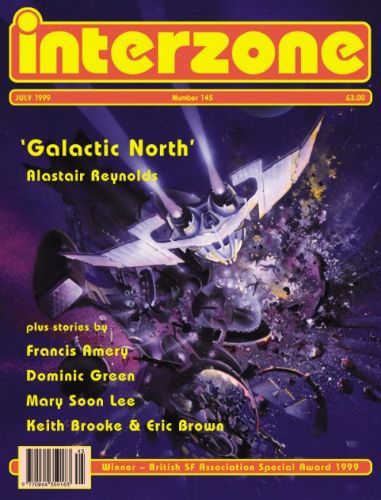Dexia Scarrow and a group of former professional soldiers are hunting down a war criminal, Colonel Jax. His last known whereabouts was an artificially intelligent, hospital ship that had served to heal both sides of the war. She heals soldiers who are sent back to fight. When the hunting party learns where Colonel Jax is at, they worry: Can the ship be sane without something to do with its time? Why had people told stories that it had been destroyed? The ship, though, is "alive and kicking," still producing organs and parts. They sneak in to avoid detection, but they are detected anyway.
A complex tale on war, no matter what your perspective. While it clearly shows the connectivity or ecology of people yet it remains beautifully complicated by a ship that may not be sane. The reread of this, which should have been similarly powerful as the first read as it gave plenty of food for thought, but this may have been its dramatic--not thematic--construction.
The closing tale, "Galactic North"--ambitious ride through millennia of time and across the galaxy--involves pirates again but who successfully take over the transporter's ship, a ship transporting human cargo toward which the captain has been made to have a motherly instinct. The head pirate may be from "Grafenwalder's Bestiary" (verifying the moral complexity of that tale). The pirates tortures Captain Irravel and Markarian. Each stands up admirably until a dire end is brought before them. Being made motherly toward these humans, Irravel (she who will not "unravel" despite her incarnations) cannot forgive Markarian, even though he did it to protect her. The reader may vacillate sympathies between the pair initially toward Captain Irravel but later toward Markarian when her actions endanger more than seems necessary.
One powerful aspect of this tale is how it mirrors the long-view of our own lives: how we begin with this strong, primary drive that gradually gains complexity over time. This one's scope is tremendous and the most ambitious of the collection. My first impression was that it fails to close, which is only somewhat true as this could be read as an attempt to reconcile two different male/female perspectives--a reading that pays off in the reread. Yet the final note focuses on the children, sort of.
The stories of Galactic North were originally published reprinted in the following (from Wikipedia)
- "Great Wall of Mars" – Originally published in Spectrum SF #1 (February 2000); reprinted in The Year's Best Science Fiction: Eighteenth Annual Collection (2001, ISBN 0-312-27465-3), Gardner Dozois, ed.; and in Galactic North
- "Glacial" – Originally published in Spectrum SF #5 (March 2001); reprinted in The Year's Best Science Fiction: Nineteenth Annual Collection (2002, ISBN 0-312-28879-4), Gardner Dozois, ed.; and in Year's Best SF 7 (2002, ISBN 0-06-106143-3), David G. Hartwell & Kathryn Cramer, eds.; and in Galactic North
- "Weather" – Originally published in Galactic North (2006) (won the Japan's Seiun Award for Best Translated Short Fiction)
- "Grafenwalder's Bestiary" – Originally published in Galactic North (2006)
- "Nightingale" – Originally published in Galactic North (2006); reprinted in The Year's Best Science Fiction: Twenty-Fourth Annual Collection (2006, ISBN 978-0-312-36335-2), Gardner Dozois, ed.
- "Dilation Sleep" – Originally published in Interzone #39 (September 1990); reprinted in Galactic North
- "A Spy in Europa" – Originally published in Interzone #120 (June 1997); reprinted in The Year's Best Science Fiction: Fifteenth Annual Collection (1998, ISBN 0-312-19033-6), Gardner Dozois, ed.; and in Galactic North; and posted free online at Infinity Plus [1]
- "Galactic North" – Originally published in Interzone #145 (July 1999); reprinted in Space Soldiers (2001, ISBN 978-0-441-00824-7), Jack Dann and Gardner Dozois, eds.; and in The Year's Best Science Fiction: Seventeenth Annual Collection (2000, ISBN 0-312-26417-8), Gardner Dozois, ed.; and in Hayakawa's SF magazine; and in Galactic North


No comments:
Post a Comment